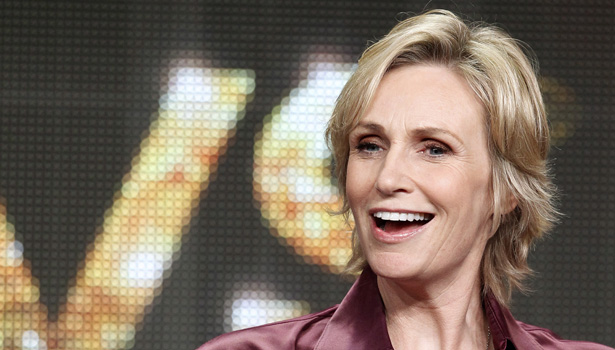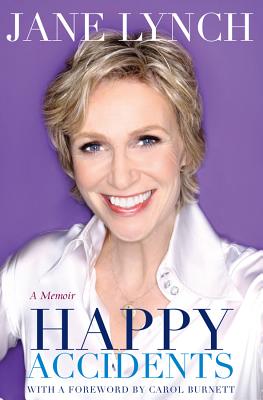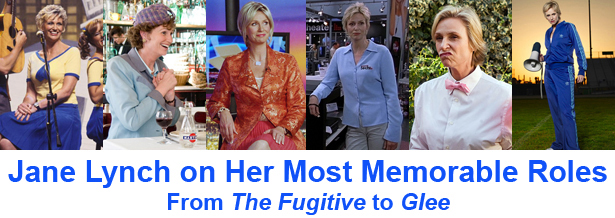How Jane Lynch Went From Wannabe Actress to Emmys Host
An interview with the Glee star about her career, her struggles, and her new memoir

Reuters
Growing up, Jane Lynch knew she wanted to be an actress. She idolized The Carol Burnett Show's Vicki Lawrence and Happy Days' Ron Howard (who she thought was "foxy") and Anson Williams (just "pretty good foxy"). Desperate for this to be her career, she would cold write to Hollywood agents as a child telling them that she was available for work--and one even wrote back. "Dear Jamie Lynch," the letter began. Addressed to the wrong name, before telling her her ambitions were a pipe dream.
Fast-forward to 2011, and Lynch is now one of Hollywood's most in-demand actors, at age 51, no less. Her new memoir, Happy Accidents, released Tuesday, recounts the journey from "Jamie's" rejection to becoming an indelible part of the Glee phenomenon. The book covers her anxiety-motivated tenacity on her way to becoming a steadily working actor--with memorable roles in films like Role Models, Best in Show, and The 40-Year-Old Virgin--as well as her battle with alcoholism and her struggle to come to terms with her homosexuality. As she gears up to host Sunday's Emmy Awards--where she's up for a second Emmy, after winning last year for her role as the acid-tongued Sue Sylvester--and next week's third season premiere of Glee, Lynch speaks with us about her new book, her life, and the long road to reaching personal and professional glee.

Hyperion Books
What's it like being one of the people who actually has a memoir?
Well, you know, I didn't set out to do it. I just kind of found myself doing it, like everything that happens in my life. I like it. I've been out of hiding for quite a while, in terms of what goes on inside of me, so I'm not at all afraid of it being out there.
And it starts off with a particularly laudatory foreword written by Carol Burnett, too. What does that mean to you?
Everything in the world. How lucky am I? She's the person who inspired me. After watching The Carol Burnett Show, I wanted to do ensemble comedy--although I didn't know it consciously. And, you know, it's kind of a gift from God. She played my mother-in-law, my mother, and now she wrote the foreword to my book. It's outlandish. It's like having every dream come true.
Over the past few years I've read memoirs written by other female comedians like Sarah Silverman, Betty White, Kathy Griffin, and Chelsea Handler. Just like you do in Happy Accidents, they all recount fondly growing up with a father who cracked them up as a kid.
Oh, that's right! Kathy's father is hilarious. And Sarah's father ... oh my God, those messages he would leave her!
Exactly. What do you think it is about having a father with a sense of humor that shapes all these funny female performers, yourself included?
It's funny, comedy because it's considered a man's field, and we girls get our main comedy inspiration from our fathers. It's interesting that we would have our focus on him so strong in our books.
Do you find yourself calling on your father's sense of humor at all in the roles that you play?
I haven't used him in any characters yet. I've used my mom many times. I am very much like my dad, though. I am more and more like him. I'll be saying things and realize that I'm doing my dad's ridiculous, corny humor. And now Haden, my daughter, and she'll use an "-erotomy" at the end of a word like my dad did to be funny, and I'll think, "Oh my God! My dad lives through my daughter!" (laughs)

You talk a lot in Happy Accidents about your own struggle to accept yourself and to come to terms with your sexuality. Do you think you would have had a different experience if there were famous, openly gay actors on TV when you were growing up, similar to how actors like Ellen DeGeneres and Chris Colfer and yourself can serve as role models now?
Absolutely. I think if there was somebody openly gay on TV in the '70s and '80s I would have felt much better about things. So I'm really happy for kids out there who get to watch people like me and Neil Patrick Harris and Ellen DeGeneres and Rosie O'Donnell and Melissa Etheridge walk through their lives having a normal life where the least of their problems is their sexual orientation.
It's still the case, though, that when actors like Neil Patrick Harris and Ellen DeGeneres are discussed in the media, and even in casual conversation, the fact that they are gay comes up high on the list of characteristics used to define them. Certainly higher than when "straight" is used on a list of characteristics describing a heterosexual actor.
That's unfortunately true, where we're at right now. But I think that will change. As far as I'm concerned, I don't go walking around saying, "I am a gay actor," or "I am an advocate of gay humor." I am a person (laughs), who has many different points of view, and many different attributes. I wouldn't pin myself into a corner as being a gay this or that. I love what Rosie O'Donnell once said. Someone once asked her that question, "As a gay person..." and she said, "You know what? I'm going to stop you right there. You wouldn't say, 'As a gay person...could you pass me the mustard?'" (laughs) So for me, as I go through my life, I try not to focus on that at all. I think it's clearly the evolution, that being gay means something right now. It's like, "Oooh. Oooh." But that will change. Black people used to marry white people and it was like, "Oooh."
You're right, things are changing. That's probably part of why Chris Colfer's character, Kurt, on Glee is so popular, and his gay teen story line is getting such a big response. What's it been like to be part of that journey and story line with Chris?
What's great about Chris's character is that it's not just young gay boys who are relating to him. America is. So many kids, when you ask who their favorite Glee character is--besides me, of course--and they'll say Kurt. They love Kurt because he has the power to stand up and show himself for being really different from a lot of kids in one aspect of his personality, and he gets embraced for it. He gets to say, "Hey, don't look at me like that! I'm the same person you are, just a different sexual orientation." I think kids really latch on to that. I think Chris is really brave. He's just great. He's such a mature kid and a wonderful person. I think he's handling this all so well.
You know, when someone watches you on talk shows or during red carpet interviews, you seem so warm and lovely that it's almost startling that Sue Sylvester comes out of you. But you write in the book about how you can relate to and connect with Sue's meanness because you were actually a lot like her when you were younger.
I was. I was out to shame and humiliate people in the way that I was feeling inside. It was Psychology 101. It's how I felt inside: shamed and humiliated. So I threw it on to other people.
Did you immediately recognize that connection to your past when you were reading for Sue?
It's funny. I didn't consciously, but it's been kind of brewing in the characters from Role Models and The 40-Year-Old Virgin. I think it started in Best in Show. The character I played in Best in Show was more transparent in how thin her bravado was. Underneath there, there was the beating heart of a kid who just wanted attention.
With characters you've played like the one in Best in Show or Sue on Glee, the comedy is mined from their extreme personalities. When you play such extreme characters, do you have some sort of barometer that keeps you from crossing a line or going so far that it undercuts the comedic effect?It's got to be connected something real emotionally. You're not being weird just to be weird. You can tell when someone is trying to push envelopes for the sake of pushing envelopes. It's always something that I explore from the inside-out, absolutely. And I love it. That's one of my favorite things in the world to do: Find an emotion and pump it up with air to see how far I can go before it pops.
Then with Party Down and Julie & Julia, you played characters that were quieter and more soulful and introspective. Do you wish you had more opportunities to play characters like that?
I'd love it. I like doing a whole bunch of stuff. Both of those characters are great, especially the Party Down character, in that there was nothing aggressive or cynical about her. Shes very, very honest, and a little deluded and kind of in her own thought-place and world. That was fun, and almost a relief, to play her every day.
And now that you're settling into a groove with Glee, which is officially a hit entering its third season, where do you want to take Sue this year? After playing her for over 50 episodes, where do you want Sue to go?
I think this whole running for Congress thing will expand who she is. I don't think she'll ever change her stripes. She's always going to be that person who lashes out and then has tenderness for the weak link. But I think being on a different stage now, the community stage and who knows perhaps how far she'll go with this political career, but I think that will invite an expansion of her own image of herself.
When the Congress storyline was introduced last year, it threw some people off guard with its seeming randomness. Now that you've actually begun shooting it, do you think it's being worked in organically?
I think it's being worked in organically. I'm still in the school, I'm still coaching the Cheerios. We're on episode three now, and so far I've made a campaign video, and I'm now number one in the polls.
How in the world does Sue become number one in the polls?
One of the guys she's running against is a racist who's still in prison.
You submitted last season's divisive "Funeral" episode as your judging tape for the Emmys this year. What was your reaction when you read that script?
Ryan Murphy came up to me and pitched the idea. He said, "I don't want to do this if you're not up for it and think it's a good idea." He pitched that my sweet sister passes away and how and the story and what that would lead to, and I said that I thought it was just great. Sue needs to go somewhere. I love her story to destroy with the glee club, but it's stretched a little far these days (laughs). So I agreed to it. I thought it was a wonderful idea.
With a hard, aggressive character like Sue who is so extreme, is it more difficult to portray the more dramatic, emotional, vulnerable moments like the you had in that episode?
No, because achieving that anger and shaming and humiliating character honestly means doing it through something real. Nobody is like that unless they're protecting something very, very tender. So you kind of have to take the walls down and the honor down and you can get right into the softness.
And not only are you nominated for another Emmy this year, but you're hosting the ceremony. How have you been approaching that gig? Are there past hosts you look up to?
I was certainly inspired by Jimmy Fallon last year because he made it look so easy, and there was such an energy about it. And I think that's just because he's such a genuinely nice person. So I took note of that. But it's a brand new thing. We sit down with the producers and the writers, and you kind of have an eye on the past because you don't want to repeat something. But for the most part it's a new great, shiny thing that you try to create.
What's your reaction each week when you open your script and read those outrageous lines that Sue's given to say?
I always laugh out loud. Sometimes I'm like "oh no you didn't!" [Glee writer] Ian Brennan says he rolls his eyes in the back of his head to write Sue's dialogue. And something dark does overcome him, that's for sure. You know, he's the nicest guy in the world, with the meanest sense of humor.
Have you ever read the script and come across a line that you thought just went too far, and you couldn't say it?
Yes. He wrote this one monologue that I say to Will Schuster. I say, "I'm going to come into your house. I'm going to give you a kitty cat, and I'm going to let you fall in love with that cat. And then in the dead of night, I'm going to break back into your house, and right in front of you I'm going to skin that cat alive." I read it, and just thought, "I can't. I can't. I have cats. I love cats." And so he changed it, to a hilarious, out-of-nowhere, and apropos-of-nothing line, "I'm going to punch you in the face."
Can you point to a moment throughout the course of the Glee phenomenon that's been the most surreal?
I was walking in Georgetown. We were there for the White House Correspondents Dinner, and all of a sudden these people singing the beginning of "Don't Stop Believing" in beautiful harmony. And I turned around, and there were kids chasing me. They circled me, and they sang a beautiful a capella version of "Don't Stop Believing," complete with the background and the harmony. They were the a capella group from George Washington University. That was very moving. I video-taped it. I was teary. It was really sweet.






